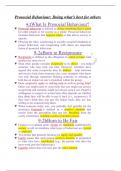Summary
Summary Exam notes for Psychology Year 2
- Course
- Psychology (SLK220)
- Institution
- University Of Pretoria (UP)
Hey! I've got these psychology notes that are pretty much a game-changer if you're into unraveling the mysteries of the mind. They're not your typical, dry study material; think of them as your go-to companion on this exploration of how we think and feel. It's like having a friendly chat about the ...
[Show more]



